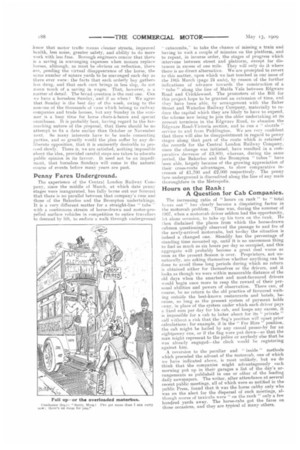A Horseless Sunday.
Page 1

Page 2

If you've noticed an error in this article please click here to report it so we can fix it.
The Chairman of the Highways Committee of the Westminster City Council, Mr. H. Thomson Lyon, has suggested to the Executive Committee of the Commercial Motor 'Users' Association that early attention should be given to the proposition for an experimental " Horseless Sunday " in some considerable area of the Metropolis. The dominating idea is to bring home to the public the numerous benefits which are gradually being conferred upon town residents by the growing use of rubber-tired motor vehicles: Mr, Thomson Lyon desires to see, by way of demonstration, a leap from, say, 10 per cent. to 100 per cent of motors on the road. We like the idea, whilst by no means oblivious to the difficulties which must be overcome before anything of the kind can be undertaken, but, we fear, a horseless Sunday—or any other day—is likely to remain in the region of the ideal for seams time to come. Can the suggestion he helped to a practical issue It goes without saying, in our judgment, that the pro . jected exclusion of horse traffic will need to be limited to one chosen section of London; physical and financial considerations alike must cause every extension of application to remove the scheme farther away from the practicable. It might be well to begin with the City of Westminster, from ono of whose representatives the idea emanates, or even a portion of that area should be sufficient: it might be necessary, having regard to the dislocation of such horse traffic as had to be in the streets, to avoid the contemporary closing of both Oxford Street and Piccadilly or both Park Lane and Regent Street. Let us suppose, then, that a reasonably-small area is agreed : the questions next arise—who can arrange the limitation, who can enforce it„ who can pay for it, and will the results be in keeping with all the trouble and outlay? The formation of a representative public committee is a condition precedent to success, and the support of London papers another ; we donlit if the wide powers which are vested in Sir Edward Henry go so far as to allow him to prohibit thoroughfares to harse traffic in this connection, but he might be approached; there are sure to be claims from horse-cabmen and horse-omnibus companies, and these might run into a total of 12,2,000. Can difficulties of this nature be met? If so, is the " game worth the candle f" We shall hope to see a response from the many who know that motor traffic means cleaner streets, improved health, less noise, greater safety, and ability to do more work with less fuss. Borough engineers concur that there is a saving in scavenging expenses when motors replace horses, although, as must be obvious on reflection, there .are, pending the virtual disappearance of the horse, the same number of square yards to be scavenged each day as there ever were: the facts that each orderly boy gathers less dung, and that each cart brings in less slop, do not mean much of a saving in wages. That, however, is a matter of detail. The brc.ad question is the real one. Can we have a horseless Sunday, and if so when We agree that Sunday is the best day of the week, owing to the non-use of the thousands of vans which belong to railway companies and trade houses, but any Sunday in the summer is a busy time for horse ehars-ii-banes and special omnibuses. It is probably best, having regard to the farreaching nature of the proposal, that there should be no attempt to fix a date earlier than October or November next. So many interests have to be made consenting parties, and so greatly would the plan suffer by any deliberate opposition, that it is eminently desirable to proceed slowly. There is, we are satisfied, nothing impossible 'about the idea, provided careful steps are taken to educate public opinion in its favonr. It need not be an impediment, that horseless Sundays will come in the natural course of events before many years are past.






















